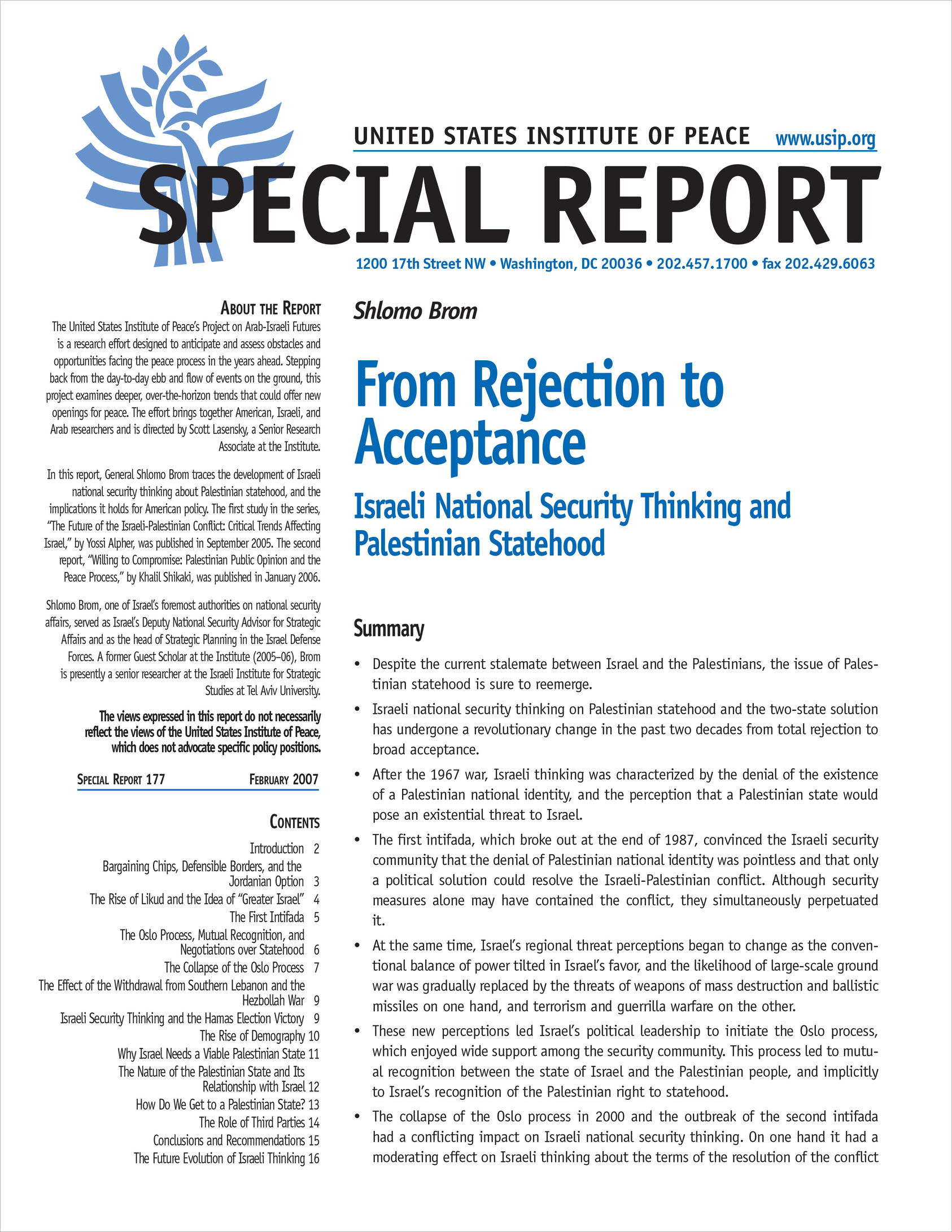Israeli national thinking on Palestinian statehood has gone from total rejection to broad acceptance. How will this evolving thinking play a role in restarting Israel-Palestinian negotiations?

Summary
- Despite the current stalemate between Israel and the Palestinians, the issue of Palestinian statehood is sure to reemerge.
- Israeli national security thinking on Palestinian statehood and the two-state solution has undergone a revolutionary change in the past two decades from total rejection to broad acceptance.
- After the 1967 war, Israeli thinking was characterized by the denial of the existence of a Palestinian national identity, and the perception that a Palestinian state would pose an existential threat to Israel.
- The first intifada, which broke out at the end of 1987, convinced the Israeli security community that the denial of Palestinian national identity was pointless and that only a political solution could resolve the Israeli-Palestinian conflict. Although security measures alone may have contained the conflict, they simultaneously perpetuated it.
- At the same time, Israel's regional threat perceptions began to change as the conventional balance of power tilted in Israel's favor, and the likelihood of large-scale ground war was gradually replaced by the threats of weapons of mass destruction and ballistic missiles on one hand, and terrorism and guerrilla warfare on the other.
- These new perceptions led Israel's political leadership to initiate the Oslo process, which enjoyed wide support among the security community. This process led to mutual recognition between the state of Israel and the Palestinian people, and implicitly to Israel's recognition of the Palestinian right to statehood.
- The collapse of the Oslo process in 2000 and the outbreak of the second intifada had a conflicting impact on Israeli national security thinking. On one hand it had a moderating effect on Israeli thinking about the terms of the resolution of the conflict and led to broad acceptance of Palestinian statehood, while on the other it deepened Israel's mistrust of the Palestinians and shook its belief in the feasibility of negotiating a permanent status agreement with the Palestinians.
- The most salient facet of present Israeli national security thinking is the growing importance of demography over geography because current population trends threaten Israel's Jewish and democratic character. As the acquisition of territory has become less important, national security is being defined in broader terms to include threats to the character of the state.
- The wide acceptance of Palestinian statehood has not precluded an intense debate on the nature of this state and its relationship with Israel. Those who assume that it will be a dysfunctional state hostile to Israel favor unilateral separation, while those who believe in the feasibility of a Palestinian state living in peace with Israel continue to argue for a negotiated settlement.
- These findings lead to several conclusions:
- Most Israelis are prepared to accept a withdrawal from most of the West Bank that will lead to the establishment of a Palestinian state. This may facilitate future negotiations.
- However, those who want to establish a limited, constrained Palestinian state through a unilateral process will create a self-fulfilling prophecy: a Palestinian state that is irredentist and in continuous armed conflict with Israel.
- The United States and its allies must try to prevent this development, which is detrimental to their interests, by encouraging dialogue between the two parties, and a negotiated settlement. At the very least, the United States should strive to turn a unilateral Israeli process into a cooperative process.
- The United States needs a policy that can accommodate renewed Israeli-Palestinian negotiations with the reality of Hamas holding public office. A nuanced, cautious policy of engagement may be the best option.
- From the Israeli perspective, the question of Palestinian statehood is deeply intertwined with the following three scenarios:
- Israeli-Palestinian negotiations resume following a Palestinian national dialogue that leads to positive changes in Hamas policies.
- Negotiations do not resume, because Hamas does not modify its positions, and Israel pushes ahead with unilateral disengagement from the West Bank. The recent war in Lebanon made this unilateral option less popular in Israel, but it is likely to reemerge.
- A mixed scenario in which unilateral Israeli steps are carried out in parallel with Israeli-Palestinian negotiations over less than comprehensive agreements. This scenario is more feasible than the first and more promising than the second.
About the Report
The United States Institute of Peace's Project on Arab-Israeli Futures is a research effort designed to anticipate and assess obstacles and opportunities facing the peace process in the years ahead. Stepping back from the day-to-day ebb and flow of events on the ground, this project examines deeper, over-the-horizon trends that could offer new openings for peace. The effort brings together American, Israeli, and Arab researchers and is directed by Scott Lasensky, a Senior Research Associate at the Institute.
In this report, General Shlomo Brom traces the development of Israeli national security thinking about Palestinian statehood, and the implications it holds for American policy. The first study in the series, "The Future of the Israeli-Palestinian Conflict: Critical Trends Affecting Israel ," by Yossi Alpher, was published in September 2005. The second report, "Willing to Compromise: Palestinian Public Opinion and the Peace Process," by Khalil Shikaki, was published in January 2006.
Shlomo Brom, one of Israel's foremost authorities on national security affairs, served as Israel's Deputy National Security Advisor for Strategic Affairs and as the head of Strategic Planning in the Israel Defense Forces. A former Guest Scholar at the Institute (2005-06), Brom is presently a senior researcher at the Israeli Institute for Strategic Studies at Tel Aviv University.